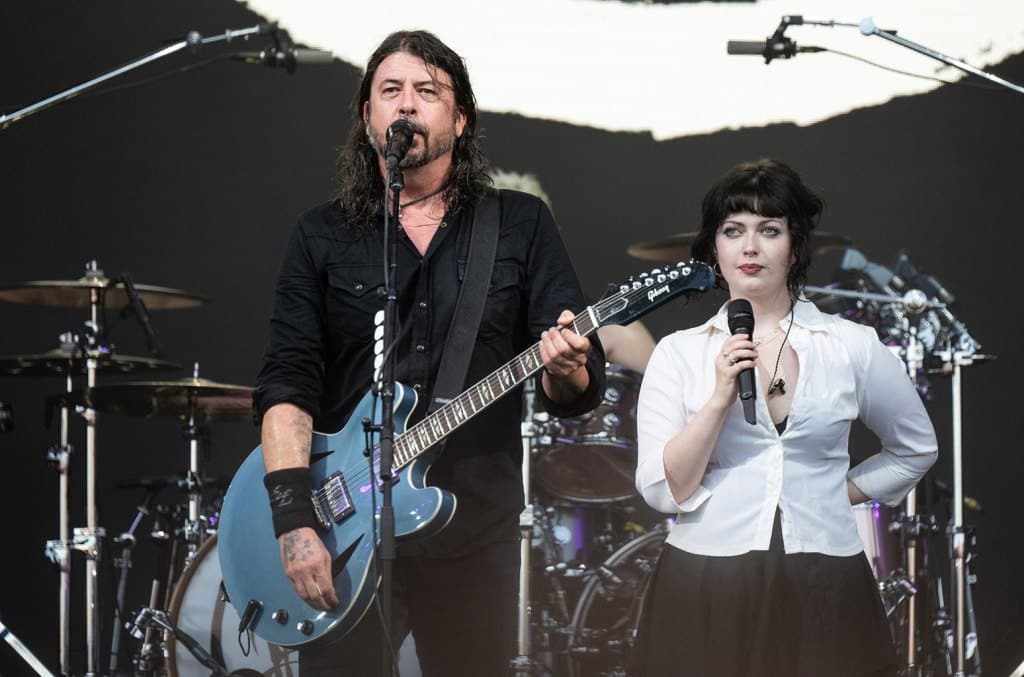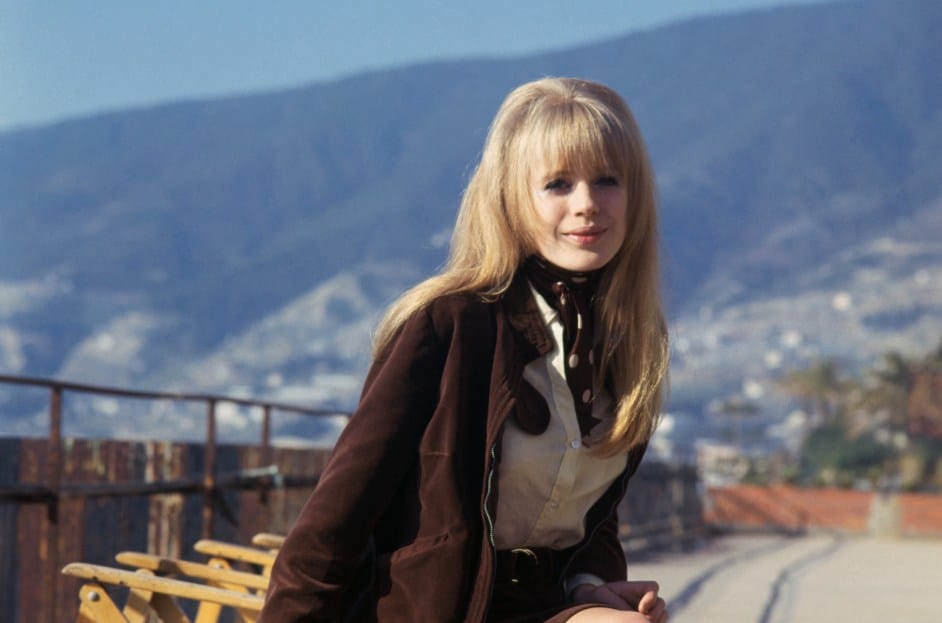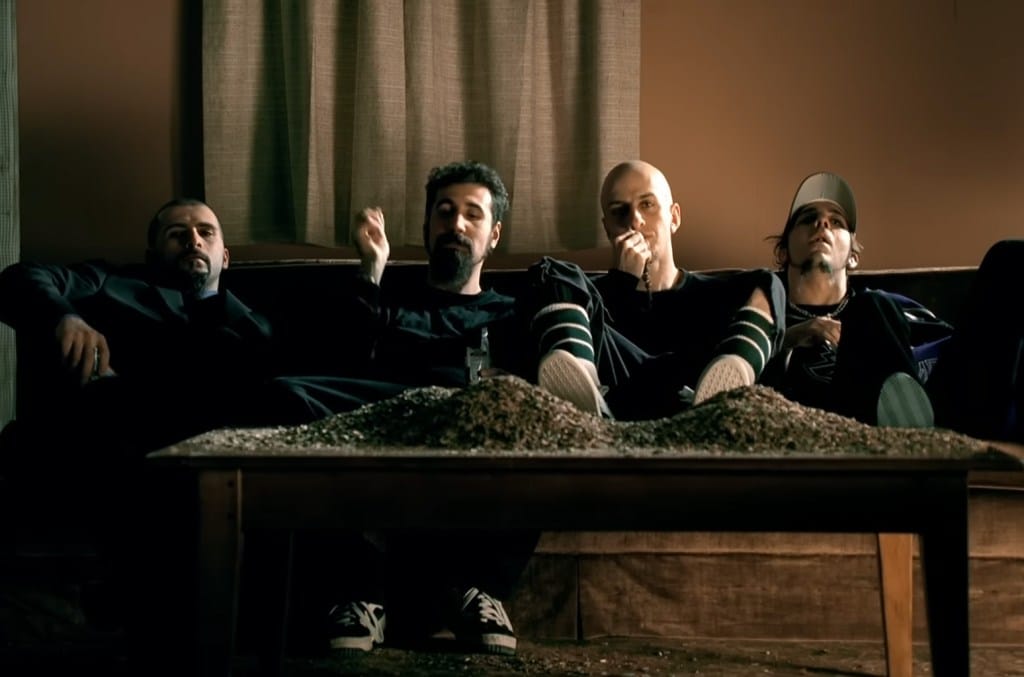Rock
Page: 39
In 2014, when Nirvana was being inducted into the Rock & Roll Hall of Fame, surviving members Dave Grohl, Krist Novoselic and Pat Smear reunited onstage to perform a raucous selection of the culture-shifting grunge band’s beloved songs. With Kurt Cobain gone, lead vocals fell to an assortment of guest singers – St. Vincent, Joan […]

On Thursday (Jan. 30) night, The Black Crowes joined an all-star lineup of rock, pop, R&B, soul, country and hip-hop luminaries with the aim of raising money for those in need following the devastating wildfires that ripped through Los Angeles earlier this month. Befitting a city as sprawling and expansive as Los Angeles, the FireAid […]
Following the news of iconic British singer and actress Marianne Faithfull’s death, the Rolling Stones have paid tribute to their longtime friend. The band’s official X account posted a throwback video of a young Mick Jagger and Keith Richards performing “As Tears Go By,” a song written by the duo and offered to Faithfull, who […]
01/30/2025
She played God on a British sitcom and remains a god for many singer-songwriters.
01/30/2025
The video for System of a Down‘s 2002 heavy metal math rock anthem “Toxicity” has hit one billion views on YouTube. The second single from SOAD’s second album finds the band best known for their embrace of urgent, tricky-time signatures raging against the machine; it is their second visual to reach the billie mark, following […]
Former MTV VJ and music industry stalwart Matt Pinfield has been placed under a temporary conservatorship following a massive stroke he suffered on Jan. 6. According to the TMZ, Pinfield’s daughter Jessica filed for the conservatorship after the stroke due to concerns about her dad’s ability to handle health and financial decisions.
Explore
Explore
See latest videos, charts and news
See latest videos, charts and news
Jessica said Pinfield, 63, a onetime Columbia Records VP of A&R who has had a number of radio gigs over the past 20 years — most recently co-hosting The Power Hour on AXS TV — suffered the stroke on Jan. 6, the same day he issued his most recent Instagram post.
In the post, the rock superfan known for his gravely voice and endless, infectioous enthusiasm for talking about alternative music wrote, “Starting another week with gratitude for a life surrounded by great people, life changing music, and unforgettable experiences that I never take for granted. Here to another week-another day-open heart and open mind. Let’s rock!”
Trending on Billboard
A spokesperson for Pinfield confirmed that he remains hospitalized following the stroke and that he is under a temporary conservatorship. The legal arrangement is typically approved to provide short-term care and protection for someone who is incapacitated and needs help managing their health care, personal finances and day-to-day needs, typically for up to 90 days.
L.A. radio station KCSN hinted at Pinfield’s health issues earlier this month when it announced he would be taking a temporary leave, telling listeners in a statement, “The SoCal Sound’s legendary DJ Matt Pinfield will be taking a temporary leave of absence. We are fully supportive of Matt and hope to have his energetic knowledge of rock n’ roll back on the air soon.”
Pinfield has had a series of health issues over the past few years, including a broken leg and lacerations in 2018 after he was struck by a car and, according to an interview with the San Francisco Chronicle in 2017, an irregular heartbeat due to years of struggles with substance use; he spent time in rehab that year. “I was dealing with A-fib (atrial fibrillation, or irregular heart rhythm),” he said at the time. “Drinking on top of it wasn’t a good idea. And it turns out I was overmedicated.”
Pinfield was photographed at disgraced shock rocker Marilyn Manson’s 56th birthday party alongside Billy Corgan, Filter’s Richard Patrick and Falling in Reverse’s Ronnie Radke, the night before his most recent Instagram post.
Check out messages of support from Pinfield’s friends and peers, including singer/producer Butch Walker, Pretty Wreckless’ Taylor Momsen, music journalist Michael Azerrad, fellow former MTV VJ John Norris and Disturbed singer David Draiman.
The Vans Warped Tour is making a highly anticipated return in 2025, celebrating its 30th anniversary with three major two-day festivals in Washington, D.C.; Long Beach, California; and Orlando, Florida.
Explore
See latest videos, charts and news
See latest videos, charts and news
The first round of artist announcements includes Warped Tour staples Simple Plan, Bowling for Soup, Pennywise, and Miss May I. The Warped Tour will also see the long-awaited reunion of ska-punk favorites Dance Hall Crashers, who are returning to the stage after 20 years, and rising pop-rock artist Chandler Leighton.
The six acts are just the beginning, with organizers planning to reveal additional names daily until Feb. 26 via Warped Tour’s social media platforms.
Trending on Billboard
Partnering with Insomniac—the production powerhouse behind Electric Daisy Carnival Las Vegas—Warped Tour 2025 aims to merge its punk rock spirit with elevated festival production. Each stop will showcase between 70 and 100 bands, spanning genres such as punk rock, pop punk, emo, alternative, and more.
“The complete lineup will be revealed over the next 30 days, with new artists announced daily until February 26. Each announcement will feature unique, artist-created content shared on the official Warped social channels,” Warped Tour organizers said in a statement, as per Metal Injection.
Vans Warped Tour founder and organizer Kevin Lyman added: “Putting together a lineup is never an easy task, but each act, both new and returning, plays an important role in delivering an unforgettable experience for fans, especially at the price point we’re offer. We collaborated closely with the bands to create some exciting surprises, exclusive content, and more for fans to enjoy. So follow along, soak in the journey, and who knows—you might just discover your next favorite band!”
Since its debut in 1995, the Vans Warped Tour has been a cornerstone of alternative music culture, launching the careers of acts like Paramore, Blink-182, and My Chemical Romance, and providing a stage for countless others.
Warped Tour 2025 Dates
June 14-15: Washington, D.C. – Festival Grounds at RFK Campus
July 26-27: Long Beach, CA – Downtown Long Beach Shoreline Waterfront
Nov. 15-16: Orlando, FL – Camping World Stadium Campus

Evan Rachel Wood issued a strong statement supporting survivors of domestic and sexual assault following Los Angeles County DA Nathan J. Hochman’s announcement last week that his office would not file domestic abuse and sexual assault charges against her ex-fiancé, shock rocker Marilyn Manson.
“My lawyer and I were advised by the Deputy District Attorneys and the Sheriff deputies who investigated the case that there was compelling evidence to support our claims, but that the statute of limitations prevents many of those crimes from being prosecuted,” Wood wrote on her private Instagram on Friday, according to People magazine. “We always knew that the statute of limitations would be a barrier, which is why we created the Phoenix Act so that other victims wouldn’t have to experience this outcome.”
Working with legislators and domestic violence survivors, Wood helped write the 2019 Phoenix Act, a California law that extended the statute of limitations for domestic violence felony crimes from three to five years. She was among a number of women who accused Manson (born Brian Warner), 56, of sexual, physical and emotional abuse, allegations the musician has denied.
On Friday, Hochman said his office decided that that statute of limitations had expired on any domestic violence charges against Manson and that they could not prove a sexual assault charge in court. In a statement, Hochman said prosecutors, “recognize and applaud the courage and resilience of the women who came forward,” thanking them for their “cooperation and patience… While we are unable to bring charges in this matter, we recognize that the strong advocacy of the women involved has helped bring greater awareness to the challenges faced by survivors of domestic abuse and sexual assault,” Hochman said.
In her statement, Wood — who had alleged that Manson “started grooming me when I was a teenager and horrifically abused me for years” — added, “Unfortunately, the Phoenix Act cannot help in cases which occurred before it was passed, but I hope this shines a light on why it’s so important to advocate for better laws. Evidence of violent crimes should not have an expiration date. I am grateful for the work law enforcement has done, and I am endlessly proud of all the survivors who risked everything to protect others by speaking the truth.”
Game of Thrones actress Bianco accused Manson of abuse in 2021 and reached an undisclosed settlement with the musician in 2023 after alleging that he had “used drugs, force and threats of force to coerce sexual acts” and had “locked Ms. Bianco in the bedroom, tied her to a prayer kneeler and beat her with a whip that Mr. Warner said was utilized by the Nazis.”
Bianco also issued a statement following Hochman’s ruling, writing on Instagram: “Whilst I am deeply disappointed by the decision of the District Attorney to not bring charges in the case against Brian Warner, I am sadly not surprised. Within our toxic culture of victim blaming; a lack of understanding of coercive control, the complex nature of sexual assault within intimate partnerships, and statutes of limitations that do not support the realities of healing; prosecutions face an oftentimes insurmountable hurdle.”
She added, “Once again, our justice system has failed survivors. Not the individual prosecutors and detectives who worked for years on this case, but the system that made them do so with one hand tied behind their collective backs. Seven years ago when I was faced for the first time with that failure, it set me out on a journey of advocacy and activism, but with that came a very clear directive. My healing and peace could not be reliant upon the outcome of a desperately broken system. I know the truth of what happened to me. It sits deeply rooted in my belly, unshakable, mine. No-one and nothing can take that away. And so to all the survivors reading this, who are being hit by yet another piece of stinging news and feeling hopeless or discouraged, let me remind you: you know your truth also. Let that be your anchor, for it is stronger than the bars of any prison.”
With truth as her guide, Bianco vowed to continue fighting for justice reform and to “shine our light onto dark realities of sexual violence and intimate partner abuse, so that we can not only understand it, but end it.” She also had a blunt personal message to Warner, writing, “By you dragging me through hell, I discovered the unstoppable force of my own power. I learnt how strong, and brave and bold I really am. I emerged as a Phoenix from the ashes that you left of my life. You also know the truth, and may you endeavor to find peace with that.”
Manson has strongly denied all the allegations, at one point filing a motion to dismiss the case filed by Bianco, in which he accused her of “cynically and dishonestly seeking to monetize and exploit the #MeToo movement.” He also filed a defamation lawsuit against Wood, claiming she had “secretly recruited, coordinated, and pressured prospective accusers to emerge simultaneously” with false allegations against the rocker. Wood denied the counter-allegations and Manson dropped the suit in November 2024, agreeing to pay $327,000 of her legal fees.
If you or someone you know has been a victim of sexual abuse, text “STRENGTH” to the Crisis Text Line at 741-741 to be connected to a certified crisis counselor.
Timothée Chalamet brought his Bob Dylan character to Studio 8H during his Saturday Night Live appearance on Jan. 25.
The 29-year-old actor, who portrays the folk icon in the new film A Complete Unknown, took on dual roles as both host and musical guest for the evening. As anticipated, Chalamet embraced his Dylan persona during his musical segments, delivering a trio of songs by the legendary artist.
Introduced by SNL alum Adam Sandler, Chalamet opened with a high-energy rendition of “Outlaw Blues,” which smoothly transitioned into a more intimate, spoken-word version of “Three Angels,” accompanied by surprise guest James Blake on keyboards and backing vocals.
Explore
See latest videos, charts and news
See latest videos, charts and news
Later in the episode, Chalamet returned with an acoustic guitar for a heartfelt cover of “Tomorrow Is a Long Time,” with Blake once again supporting him on vocals and keys. During his opening monologue, Chalamet shared that he chose these songs because they are his “personal favorites.”
Trending on Billboard
Fresh off portraying Dylan in James Mangold’s A Complete Unknown — which has earned eight Academy Award nominations, including best picture — Chalamet previously revealed that he performed all his own vocals for the film.
Saturday marked Chalamet’s first time serving as SNL’s musical guest, although he’s appeared on the show twice before. He first hosted in 2020 and returned in 2023, starring in a viral sketch where he portrayed Troye Sivan in a sleep-paralysis hallucination.
SNL is currently in its 50th season, with a special anniversary episode set for Feb. 16. This season has also featured notable hosts like Ariana Grande, Charli XCX, John Mulaney, Chris Rock and Martin Short, while musical guests have included Hozier, Gracie Abrams and Stevie Nicks, among others.
Watch Chalamet’s SNL performances below. For those without cable, the broadcast streams on Peacock, which you can sign up for at the link here. Having a Peacock account also gives fans access to previous SNL episodes.

 State Champ Radio
State Champ Radio 







